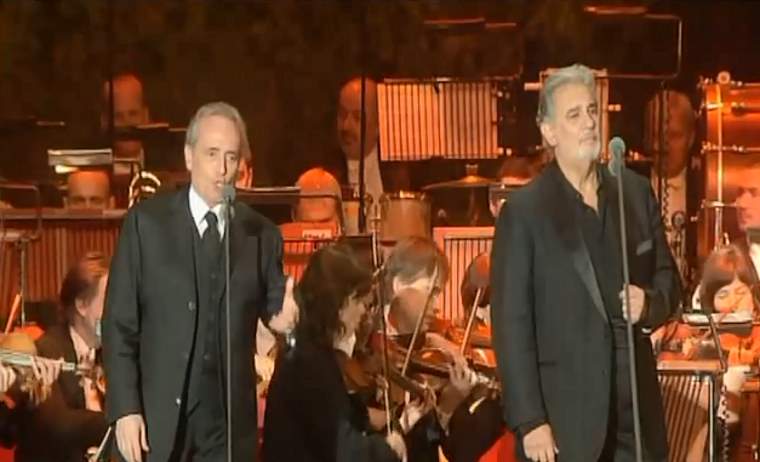Spanish tenor Plácido Domingo sings the famous tenor aria (romanza) “Amor, vida de mi vida” from the zarzuela Maravilla. Salzburg, 2007.
Amor, vida de mi vida
The aria “Amor, vida de mi vida” is composed by the Spanish composer Federico Moreno Torroba to a libretto by Antonio Quintero and Jesús María de Arozamena. The zarzuela Maravilla premiered in Madrid in 1941, where the aria was sung by the tenor, Luis Sagi-Vela. It is one of the most famous arias in the Spanish language and was included in the repertoire of The Three Tenors (sung by Plácido Domingo).
Zarzuela is a Spanish lyric-dramatic genre that alternates between spoken and sung scenes, the latter incorporating operatic and popular songs, as well as dance. The etymology of the name is uncertain, but some propose it may derive from the name of a Royal hunting lodge, the Palacio de la Zarzuela near Madrid, where, allegedly, this type of entertainment was first presented to the court.
The palace was named after the place called “La Zarzuela” because of the profusion of brambles (zarzas – a species of wild blackberry known by the English common name elm leaf blackberry or thornless blackberry and the Spanish common name zarzamora) that grew there, and so the festivities held within the walls became known as “Zarzuelas”.
There are two main forms of zarzuela: Baroque zarzuela (c. 1630–1750), the earliest style, and Romantic zarzuela (c. 1850–1950), which can be further divided into two. Main subgenres are género grande and género chico, although other sub-divisions exist.
Amor, vida de mi vida Lyrics
The aria expresses the heartache of Rafael, a talented but unlucky singer, in love with Elvira. However, Elvira is in a relationship with Faustino, who is the theatrical producer of her mother, Maravilla, an opera diva who will be Rafael’s partner in her next performance.
Spanish: Amor, vida de mi vida
Adiós dijiste;
se va mi vida.
Llorar quisiste
por un amor que hay
que olvidar.
Te vas riendo
¡y yo me muero!
Mi dolor es saber
que no puedes llorar.
Amor, vida de mi vida,
¡qué triste es decirse adiós!
Te llevas la juventud
de éste querer sin redención,
amor que por el camino
no puedes volver atrás.
Te ríes cuando sientes
deseos de llorar.
Y pensar que te amé
con alma y vida,
y hoy te quieres
reír de mi querer.
Este amor que soñé
no lo puedo callar.
Fueron falsas palabras,
mentiste mil veces
tu amor, mujer.
Amor, vida de mi vida, etc.
¡Adiós, mi bien!
¡Ah, adiós!

Related: Plácido Domingo sings Malagueña
English: Love, Life of My Life
You said goodbye;
so my life has gone.
You wanted to weep
for a love that has
to be forgotten.
You go away laughing
and I am dying!
My sadness is knowing
that you cannot weep.
Love, the life of my life,
how sad it is to say goodbye!
You leave our youthful
love unredeemed,
a love which your destiny
cannot return to you.
You laugh when you feel
the wish to cry.
And to think that I loved you
heart and soul,
and now you want
to mock my grief.
This love that I dreamt of,
I cannot suppress.
They were false words,
you lied a thousand times
in your love, woman.
Love, life of my life, etc.
Goodbye, my love!
Ah, goodbye!
Sources
- Amor, vida de mi vida on Wikipedia
- Zarzuela on Wikipedia
- Federico Moreno Torroba on Wikipedia


Luis Sagi-Vela is a Baritone, not a tenor.